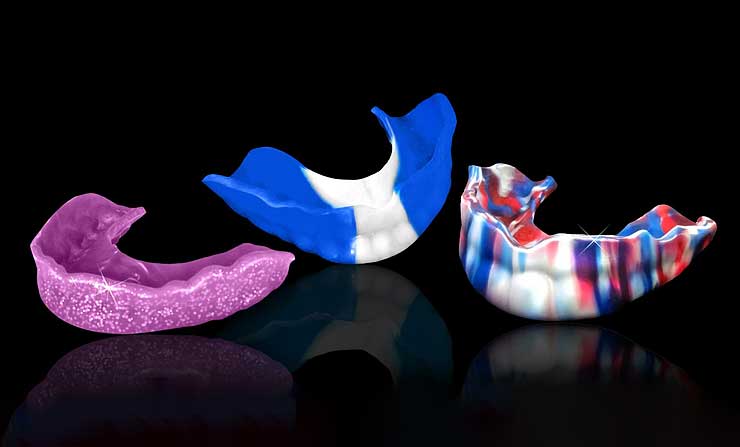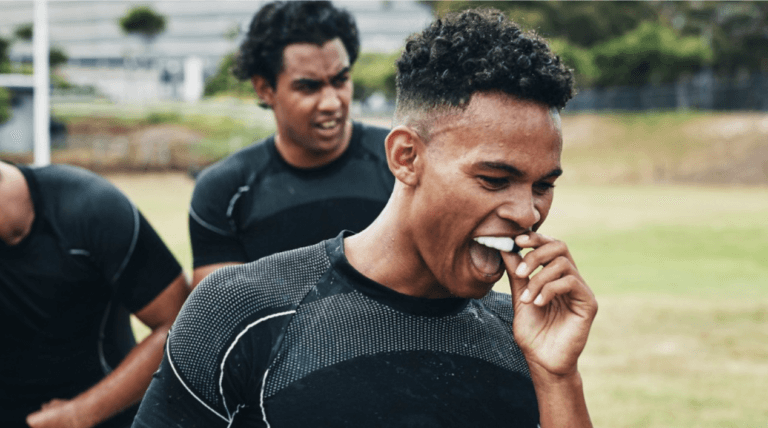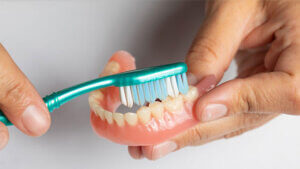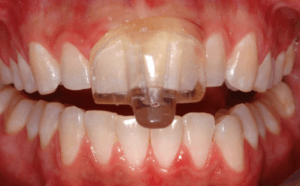Sports Mouth Guard

What Is A Sports Mouth Guard?
A Sports Mouth Guard, also known as an athletic mouth guard or a sports mouthpiece, is a protective device designed to cover and cushion the teeth, gums, and surrounding oral structures. It is typically made from a soft and flexible material that conforms to the shape of your teeth, providing a comfortable fit. When correctly worn, the mouth guard acts as a barrier, reducing the risk of dental injuries such as broken teeth and knocked out teeth.
Before deciding on whether A Sports Mouth Guard are right for you, there are some things you should know:
- Who Needs A Sports Mouth Guard?
- What Are The Advantages Of A Sports Mouth Guard?
- How Much Does A Sports Mouth Guard Cost?
- What Are The Steps In The Sports Mouth Guard Procedure?
- How Long Does A Sports Mouth Guard Last?
- What Are Common Problems with A Sports Mouth Guard?
If you have any further questions about Sports Mouth Guards or other dental services offered at Atlas Dental, please contact us.

Free phone consultation
Have questions about mouth guards? Schedule a free phone consultation with our Toronto dentist

5 star google reviews
Our patients love our mouth guards! See why people are choosing Atlas Dental

BOOK A MOUTH GUARD APPOINTMENT ONLINE
We use the latest in 3D scanning and 3D printing technology to make you the right mouth guard
Who Needs A Sports Mouth Guard?
The need for a sports mouth guard extends far beyond professional athletes and applies to anyone participating in sports or recreational activities where there is a risk of impact to the face or mouth. Whether you’re a seasoned athlete or a casual player, protecting your teeth and mouth should be a top priority to avoid potentially serious dental injuries.
Here are some categories of individuals who can benefit from using a sports mouth guard:
- Athletes: Athletes involved in contact sports such as football, rugby, wrestling, and boxing are at a higher risk of sustaining dental injuries due to collisions, falls, or accidental contact with other players or equipment. However, it’s essential to understand that even non-contact sports like soccer, basketball, and baseball carry a risk of dental trauma from collisions or falls.
- Children and Teenagers: Children and teenagers involved in sports, whether organized or informal, are particularly susceptible to dental injuries due to their active nature and still-developing coordination skills. A properly fitted sports mouth guard can offer excellent protection during their formative years.
- Recreational Enthusiasts: Even if you engage in recreational activities like skateboarding, biking, or rollerblading, wearing a sports mouth guard is a smart precautionary measure. Accidents can happen unexpectedly, and a mouth guard can significantly reduce the severity of potential oral injuries.
- Individuals with a Teeth Clenching or Teeth Grinding Habit: Some individuals have a habit of clenching or grinding their teeth, especially during intense physical activities or high-pressure situations. A sports mouth guard can help protect against dental damage caused by these habits, as well as reduce stress on the jaw joint (TMJ).
- Individuals with Prior Dental Injuries: If you have previously experienced dental injuries or have undergone dental treatments to repair damaged teeth, using a mouth guard becomes even more critical to prevent further damage or reinjury.
It’s important to recognize that dental injuries can be painful, expensive to treat, and may require extensive dental work or even surgery. Fortunately, the use of a sports mouth guard can significantly reduce the incidence and severity of such injuries, providing you with peace of mind while you stay active and enjoy your favorite sports. If you have further questions about Sports Mouth Guards, please contact us.
What Are The Advantages Of A Sports Mouth Guard?
Investing in a sports mouth guard offers a range of significant advantages, making it an indispensable piece of protective gear for athletes and sports enthusiasts alike. Let’s explore the key benefits of using a sports mouth guard:
- Dental Injury Protection: The primary purpose of a sports mouth guard is to provide a protective barrier for your teeth, gums, and jaws during physical activities. It absorbs and disperses the impact forces that may result from collisions, falls, or blows to the face, reducing the risk of dental injuries such as chipped teeth or broken teeth, knocked-out teeth, and soft tissue damage to the lips and cheeks.
- Comfort and Customization: Sports mouth guards are designed to fit snugly over your teeth, providing a comfortable and secure fit. Custom-made mouth guards, crafted by dental professionals, offer the highest level of comfort and protection. They are specifically tailored to your mouth’s unique shape, ensuring optimal coverage and ease of breathing and speaking during sports activities.
- Improved Athletic Performance: Wearing a sports mouth guard can boost an athlete’s confidence, allowing them to focus entirely on their performance without worrying about potential dental injuries. When athletes feel safe and protected, they can perform at their best and maximize their potential on the field or court.
- Preservation of Dental Work: For individuals with dental restorations like crowns, bridges, or veneers, a sports mouth guard acts as a safeguard, preventing damage to these dental investments and extending their longevity.
- Cost-Effective Protection: The cost of a sports mouth guard is minimal compared to the potential expenses associated with dental treatments for injuries. By investing in a mouth guard, athletes can save themselves from costly dental procedures in the future.
- Promotion of Oral Health: Apart from protecting against acute injuries, using a sports mouth guard can indirectly support your overall oral health. It may discourage habits like teeth clenching or grinding during sports, which can contribute to tooth wear and other dental issues over time.
Remember, not all mouth guards offer the same level of protection. Over-the-counter mouth guards may provide some degree of safeguarding but may not fit as well or offer as much protection as custom-made mouth guards. For optimal results and enhanced protection, consult your dentist to get a custom-fitted sports mouth guard that best suits your individual needs and the type of sports you engage in. If you have further questions about Sports Mouth Guards, please contact us.

Cost of Sports Mouth Guard
Our Sports Mouth Guards protect your teeth from impact to the face or mouth during sports or other recreational activities. For a typical mouth guard, you can expect to pay $174 plus Lab Fee ($200). The codes relevant to night guards in the Ontario Dental Association’s Suggested Fee Guide appear as follows:
Appliances, Control of Oral Habits, Adjustments, Repairs, Maintenance
- 14502 – Maxillary Appliance: $174 + Dental Lab Fee ($200)
Night Guards are considered a basic service under all dental insurance plans and should be covered to your maximum insurable limit, but be sure to find out from your dental insurance plan provider how much you are eligible for before going ahead with dental treatment. Our fees are consistent with the ODA Fee Guide.
For patients without dental insurance, Atlas Dental is pleased to offer dental financing through Dentalcard. Affordable payment plans start at 7.95% for terms of 6 months to 6 years. To learn more about Dentalcard dental treatment financing, follow this link.
What Are The Steps In The Sports Mouth Guard Procedure?
Getting a sports mouth guard involves a straightforward process that ensures the mouth guard fits comfortably and provides optimal protection. Here are the typical steps in the sports mouth guard procedure:
- Consultation with a Dental Professional: Schedule an appointment with your dentist to discuss your need for a sports mouth guard. During the consultation, inform your dentist about the sports you participate in and any dental concerns you may have. Your dentist will assess your dental health and determine if a sports mouth guard is the right choice for you.
- Taking Impressions: If a sports mouth guard is recommended, the dentist will take physical molds or digital scan impressions of your upper and lower teeth using a dental putty or a digital scanning system. These impressions are precise molds of your teeth, ensuring the mouth guard will fit snugly and comfortably. Based on the impressions, a custom-fitted mouth guard will be fabricated in a dental laboratory.
- Fitting Appointment: Once the mouth guard is ready, you will return to the dental office for a fitting appointment. Your dentist will ensure that the mouth guard fits perfectly and make any necessary adjustments to achieve the ideal fit.
- Instruction and Care Guidelines: During the fitting appointment, your dentist will provide instructions on how to wear and remove the mouth guard properly. You will also receive guidelines on cleaning and caring for the mouth guard to maintain its hygiene and extend its lifespan.
- Check for Comfort and Functionality: Your dentist will check for comfort and functionality by asking you to bite, talk, and move your jaw while wearing the mouth guard. This step ensures that the mouth guard does not cause any discomfort or interfere with your ability to communicate effectively during sports activities.
- Regular Follow-Ups: Regular dental check-ups are essential to monitor the condition of your sports mouth guard and to ensure that it continues to provide optimal protection. Your dentist may recommend periodic replacements if the mouth guard shows signs of wear and tear or if there are any changes in your dental structure.
It’s crucial to note that custom-fitted sports mouth guards offer superior comfort, retention, and protection compared to over-the-counter options. If you have further questions about Sports Mouth Guards, please contact us.

How Long Does A Sports Mouth Guard Last?
The lifespan of a sports mouth guard depends on several factors, including the quality of the materials, frequency of use, and how well it is cared for. While a sports mouth guard is a durable piece of protective equipment, it is essential to monitor its condition regularly and replace it when necessary to ensure continued effectiveness. Here are some guidelines on how long a sports mouth guard typically lasts:
- Frequency of Use: The more frequently you engage in sports or physical activities, the faster your mouth guard will wear out. Athletes who participate in sports regularly may need to replace their mouth guards more often than occasional players.
- Quality of Materials: Custom-fitted mouth guards made from high-quality materials tend to last longer than generic, over-the-counter options. Dental professionals typically use durable materials in custom mouth guards, making them more resistant to wear and tear.
- Dental Growth and Changes: For children and teenagers, dental growth and changes in the mouth’s structure can affect the fit of the mouth guard over time. As a result, young athletes may need new mouth guards more frequently to accommodate these changes.
- Wear and Tear: Regular use of a sports mouth guard can lead to wear and tear. The mouth guard may become stretched, torn, or lose its shape over time, impacting its effectiveness.
- Hygiene and Maintenance: Proper cleaning and maintenance are crucial for prolonging the life of your sports mouth guard. If not cared for adequately, the mouth guard can accumulate bacteria, leading to odors and degradation of the material.
- Dental Health Changes: Significant changes in your dental health, such as dental work (e.g., dental restorations or braces) or tooth loss, may necessitate a new mouth guard to accommodate these alterations.
As a general rule of thumb, a custom-fitted sports mouth guard made by a dental professional can last anywhere from one to three years with proper care. However, it’s essential to inspect the mouth guard regularly for signs of wear, tear, or damage. If you notice any of the following signs, it’s time to consider replacing your sports mouth guard:
- Cracks or tears in the material
- Distorted shape or loss of fit
- Signs of discoloration or buildup of bacteria
- Unpleasant odors despite regular cleaning
- Any damage that compromises the mouth guard’s ability to provide protection
Replacing your sports mouth guard promptly when it shows signs of wear ensures that you continue to receive optimal protection during sports and physical activities. Consult with your dental professional for guidance on when it’s time to replace your mouth guard and to get a new custom-fitted mouth guard that suits your current dental needs and sports preferences. If you have further questions about Sports Mouth Guards, please contact us.
What Are Common Problems with A Sports Mouth Guard?
While sports mouth guards are effective protective gear, they may sometimes encounter common problems that can compromise their functionality and comfort. Being aware of these issues can help you address them promptly and ensure that your mouth guard continues to offer optimal protection. Here are some common problems with sports mouth guards:
- Poor Fit: A sports mouth guard that does not fit properly may lead to discomfort, difficulty breathing, and inadequate protection. Ill-fitting mouth guards may be too loose, too tight, or fail to cover all teeth adequately, leaving vulnerable areas exposed.
- Material Degradation: Over time, the material of a sports mouth guard can degrade due to regular use, exposure to saliva, and cleaning agents. Degraded materials may become less effective in absorbing impact forces, reducing the mouth guard’s protective capabilities.
- Bacterial Buildup: Without proper hygiene, sports mouth guards can accumulate bacteria, leading to foul odors and potential oral health issues. Bacterial growth can also cause irritation or infections in the mouth.
- Tears and Cracks: Continuous use and impact can lead to tears and cracks in the mouth guard material. Damaged areas may compromise the overall structural integrity and protection offered by the mouth guard.
- Interference with Speech and Breathing: In some cases, poorly designed or improperly fitted mouth guards may interfere with an athlete’s ability to speak clearly or breathe comfortably during physical activities.
- Chewing or Biting Habit: Some individuals may have a habit of chewing or biting on their mouth guard, which can cause premature wear and reduce its effectiveness over time.
- Incompatibility with New Dental Work: Mouth guards that are not designed to accommodate new or future dental work, such as braces or dental restorations, may cause discomfort or interfere with the fit of these dental appliances.
- Non-Compliance: The effectiveness of a sports mouth guard depends on consistent and proper usage. Athletes who do not wear their mouth guards as recommended may be at higher risk of dental injuries.
If you experience persistent issues with your sports mouth guard, consult your dental professional for guidance and to explore the possibility of getting a custom-fitted replacement. If you have further questions about Sports Mouth Guards, please contact us.
We also think you’ll like…

Night Guard
Night Guard What Is A Night Guard? If you often wake up with a sore jaw, tension headaches, or notice increased tooth sensitivity, you might

Hard Acrylic Night Guard
Hard Acrylic Night Guard What Is A Hard Acrylic Night Guard? A Hard Acrylic Night Guard is a type of night guard dental appliance made

Dental Night Guard Pre-Visit Instructions
Dental Night Guard Pre-Visit Instructions What You Should Do Before Your Dental Night Guard Scan Appointment While night guards won’t prevent these habits, they do

Dental Night Guard Post-Insertion Instructions
Dental Night Guard Post-Insertion Instructions What You Should Do After Receiving Your Custom Fitted Dental Night Guard While night guards won’t prevent these habits, they

How to Keep Removable Oral Appliances Clean
How to Keep Removable Oral Appliances Clean Removable oral appliances like dentures, retainers, or nightguards play a crucial role in our oral health, whether they’re

NTI Night Guard
NTI Night Guard What Is An NTI Night Guard? Do you often wake up with headaches, jaw pain, or notice signs of teeth grinding? If

